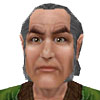In a 1958 lecture, published in Silence in 1961, John Cage said,
This is a lecture on composition which is indeterminate with respect to its performance. That composition is necessarily experimental. An experimental action is one the outcome of which is not foreseen. Being unforeseen, this action is not concerned with its excuse. Like the land, like the air, it needs none. A performance of a composition which is indeterminate of its performance is necessarily unique. It cannot be repeated. When performed for a second time, the outcome is other than it was. Nothing therefore is accomplished by such a performance, since that performance cannot be grasped as an object in time. A recording of such a work has no more value than a postcard; it provides knowledge of something that happened, whereas the action was a non-knowledge of something that had not yet happened.
I assume Cage felt that musicians are needed to perform such works. He wanted the indeterminacy of the performance to be a function of the compositional work and not just a mishmash of the collective subjectivity of the musicians. He needed musicians capable of suspending their egos while performing. The skills of such musicians would have to be quite different from classical musicians. They would need to perform a work, the outcome of which is not foreseen, and perform it in such way that nothing is accomplished. Why should we call this activity a performance?
I share with Cage the desire to write compositions which are indeterminate with respect to their ‘performance’. But I want to eliminate the performer. A composition capable of presenting itself needs none.
This is made possible if the composition consists of a specific patch along with specific settings of the machine controls. This sort of work cannot be performed by a person without it becoming some other work. Such works are determinate with respect to their composition, but indeterminate with respect to their ‘realization’, since the composition uses controls selected by design to add unpredictability. By realization I mean a situation in which listeners can experience the work. It requires a hall and an audience and a technician who can read patch diagrams and other compositional notations who installs and prepares the work. Instructions for realizations might include rules for starting and ending the audible portion of the event, as well as indications for calibrating the loudness of the amplification. But none of this is performance (and it is not to be interpreted as theater). Although this differs from Cage in not needing a performer, it shares his vision of a musical event that is indeterminate in its occasion, but not of its composition. Such an event accomplishes nothing, since accomplishment needs a skilled player. Since there’s nothing to accomplish, mistakes are impossible and there is nothing to excuse. A recording of such an event would have no more value than a postcard. The musical value of such an event would lie wholly within the multiple centers of its listeners, to use Cage’s language. This value cannot be grasped, captured, or saved.
So when you browse over to the New Music category, think of the recordings as postcards from my studio. Given what I’ve said, it should be clear that those in which I performed the controls or improvised during the recording are not ones that I am most satisfied with.
